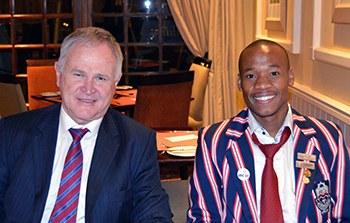 |
Student disputes at the University of the Free State (UFS) will be regulated henceforth by the Student Court that has been re-established at the Bloemfontein Campus. The Student Court will offer practical training to law students thus strengthening their theoretical knowledge to produce employable graduates.
The Student Court was launched on Friday 21 August 2015, cultivating a self-determined studentship and citizenship, of which South Africa can be proud.
Advocate Barry Roux, Oscar Pistorius’s defence attorney, Judge Lebotsang Bosielo, of the South African Supreme Court of Appeal, Profs Caroline Nicholson, Dean of the Faculty of Law, and Teuns Verschoor, Chairperson of the UFS Disciplinary Board, attended this auspicious event.
During his keynote address, Adv. Roux said the Student Court serves as a stepping-stone in the practice of integrity, respect, and preparedness within the law profession.
“Young professionals have a mandate to excel. No matter what, stick to honesty and the truth. If you want to be a role model and make your family proud, do more.” he advised.
Judge Lebotsang Bosielo urged students to use “the rare opportunity to practise and uphold the law with austerity.”
“You should broaden the knowledge of substantive law, law of evidence, procedural law, and the Constitution of South Africa. Opportunities such as the Student Court enable law students to strengthen the practice of theory beyond the parameters of the lecture rooms,” he emphasised.
The re-establishment of the Student Court was initiated by Lindokuhle Ntuli, Student Representative Council (SRC) member on Legal and Constitutional Affairs. The UFS Council approved the proposal for the court in 2006, but it had remained inactive since then. It was not until 2014 when Lindokuhle assumed office that the concept was revived.
“As an independent body, the Student Court is ready to exercise its legal powers with the aim of establishing a student community and a culture of student governance committed to justice, equality, and accountability,” he said.